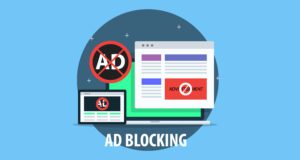
Ad Blockers and PPC – Turning a Threat Into an Opportunity

Here at Embryo, planning, designing and launching landing pages are a key part of our PPC services. A landing page is a page that users click through to form a paid ad in the search results. These pages are dedicated to targeting specific keywords, personas, and demographics.
However, PPC campaigns face threats due to ad blockers. You might be pouring your marketing budget into PPC advertising campaigns, only to see diminishing results. Don’t let your marketing efforts go down the drain.
In this guide, we will teach you everything you need to know about ad blockers, how they work with PPC ads, and what you can do to make sure your PPC adverts thrive.
What Are Ad Blockers?

Ad blockers, sometimes known as content blockers, are simple software programmes that prevent ads from being shown on websites. Typically, ad blockers are browser add-ons and are available for Chrome, Firefox, Opera, Safari, and Internet Explorer web browsers.
Many users install ad blockers to eliminate intrusive and irrelevant ads from their online experience. As a result, the impact on PPC campaigns has been significant.
In bad news, if you’re running a PPC or display campaign targeting mobile users on an Apple device and they have an ad blocker installed, then they won’t see your ads.
It doesn’t matter what extensions you’re using or how good your ads are – if a user with a blocked ad searches for a keyword you’re bidding on, then they won’t see your ad at all.
Senior PPC Exec Olly discusses the overall impact:

Certain ad blockers will prevent google ads showing, so errors will be displayed and your ads wont be visible, however its a low utilisation rate and typically wont affect PPC, due to the volume of users not adopting ad blockers
Why Do Users Install Ad Blockers?
Understanding how ad blockers work is essential to grasp why users choose to install them. The answer lies in user experience. Many internet users grow frustrated with intruse and irreverent ads that disrupt their online activity.
Pop-ups, autoplay videos, and flashing banners are just some examples of the types of ads that users find irritating. Ad blockers provide a solution to this problem by giving users the ability to control the ads they see or eliminate them altogether.
How To Manage PPC Campaigns
Unfortunately, ad blockers are here to stay, and trends suggest higher user rates for the foreseeable future. So, the sooner you adapt, the better it is for PPC marketing services. Here are some of the ways you can deal with ad blockers:
- Follow ad industry regulatory bodies
- Ask users to disable ad blockers
- Use a subscription model or paywall
Let’s have a look at these in a bit more detail.
Follow Ad Industry Regulatory Bodies

The Coalition for Better Ads is a regulatory body that aims to improve the digital advertising industry. Its board members include:
- Microsoft
- News Corp
- Unilever
To illustrate the importance of complying with the standards of BAS, consider the user rate of Google Chrome – globally it accounts for 63.58% of the browser market. Publishers that do not follow the BAS guidelines will not pass through a Chrome ad blocker and tap into a massive market of users.
How To Fix This?
One way to manage PPC campaigns is to ask users to allow ads. This could include allowing users to access a certain number of posts, and then show a message requesting them to disable ad-blocking.
Websites with massive followings can gate content. Therefore, users can only read articles if they turn off their ad blocker.
Also, rather than relying on PPC marketing services, companies can create another revenue stream, such as a paywall. This subscription model monetises gated content by letting users access articles after paying a fee.
Since users are paying for access, gated content must be high-quality and worth the money. Whilst it’s possible to include some ads, keep them to a minimum and non-intrusive.
Mixing ads and a subscription model is an excellent way to offset the negative impact of ad blockers. It is up to you to experiment and determine the best mix for optimal results.
The Future of PPC Advertisers Regarding Ad Blockers
Ad blockers have undoubtedly disrupted the world of online advertising, posing challenges for advertisers and marketers. However, by understanding how ad blockers work, why users install them, and implementing effective strategies, you can overcome these obstacles and optimise your PPC campaigns.
By staying ahead of the curve and exploring new opportunities, you can ensure the success of your PPC campaigns in the face of ad blockers.
Now that you have a better understanding of ad blockers and their impact on PPC campaigns, don’t hesitate to get in touch for your personalised PPC audit with us today!
FAQs
Answered by Callum Leonard
Do ad blockers work on all types of ads?
No ad blockers don’t work on all types of ads, however, they can still be very harmful for PPC campaigns and collecting data.
How do I measure the impact of blockers on my PPC campaigns?
You can follow ad industry regulatory bodies, ask users to disable ad blockers & use a subscription model.
Will ad blockers be the death of PPC?
Ad blockers are here to stay but if you understand how they work and implement effective strategies with this in mind you can overcome this obstacle.
Do ad blockers prevent paid results on the SERP?
Yes, some ad blockers can prevent paid results from appearing.